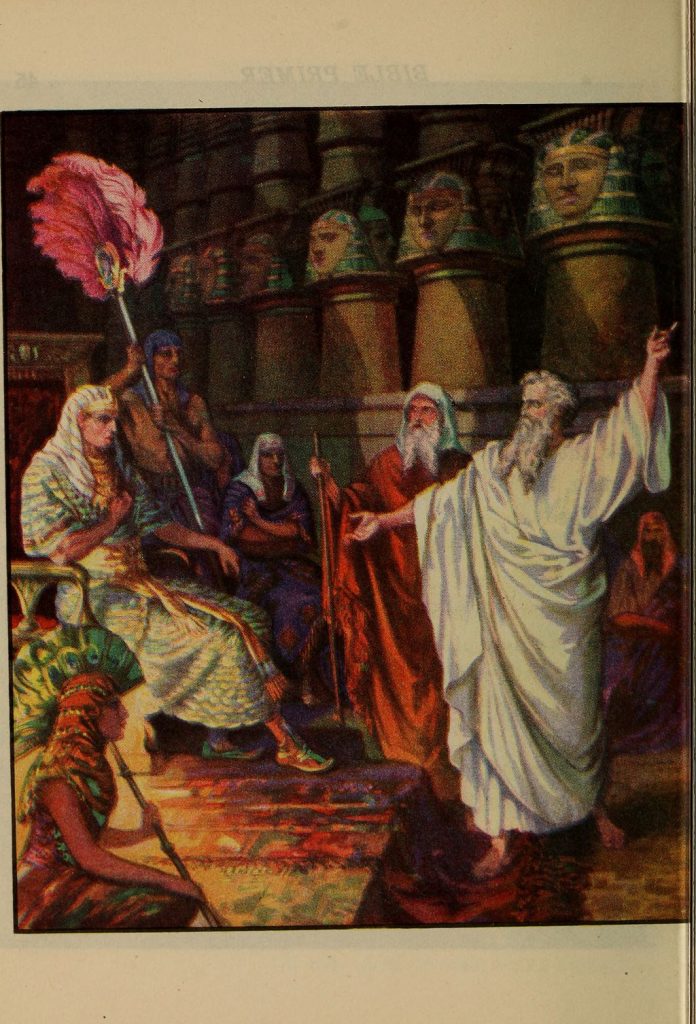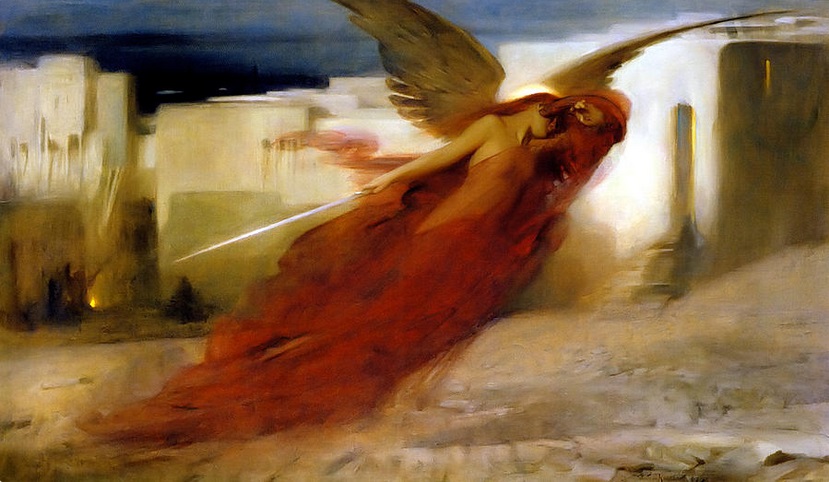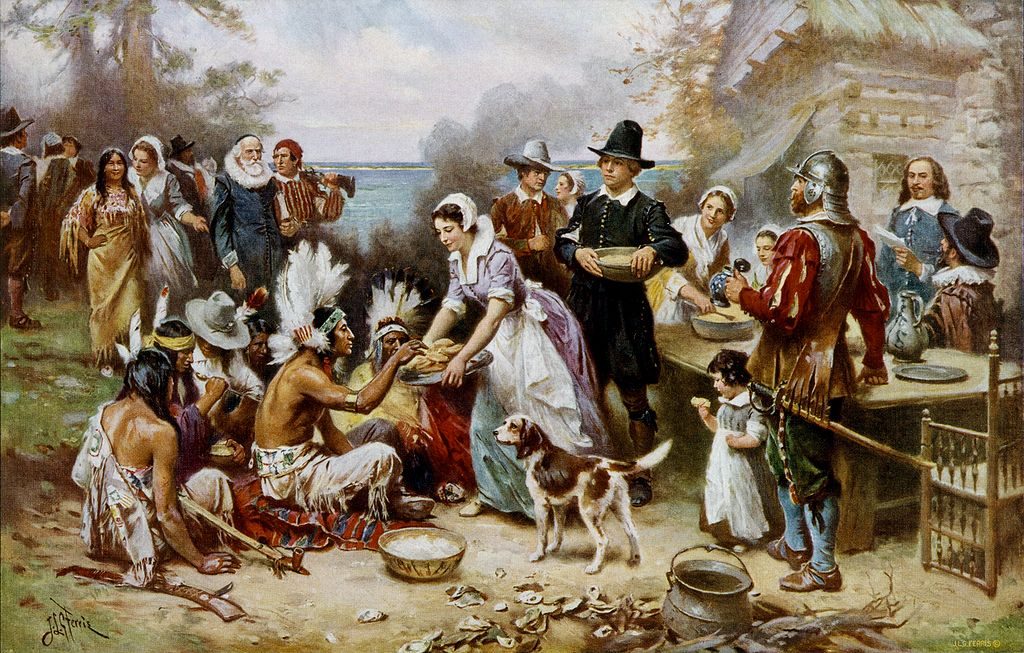American Passover, its Seder, its foundational myth are all on life support and so is America itself

Copyright: Internet Archive Book Images [No restrictions]
When I had my engineering company in Boston several years ago, I visited a new potential client in Southern Germany. This company was the world’s premier manufacturer of critical auto parts like ball bearings and gears and was eponymously named after its founder. It’s products are found in most German cars and those of many other high-end car manufacturers.
Upon entering the gleaming glass edifice that was the company’s headquarters, I noticed that in the middle of the soaring atrium, many stories high, there was a kind of a glass enclosure, not particularly large, in the middle of which there stood a wooden wheelbarrow. This wheelbarrow was in no way remarkable and in fact other than looking rugged and utilitarian, exhibited rather poor craftsmanship and seemed to have been cobbled together from various mismatched pieces of wood and metal. There was no plaque of any kind.
As I was examining the wheelbarrow, I heard someone speak my name. “Herr Doctor Engineer Pletner, I presume.” I turned around and saw a tall and distinguished gentleman in a lab coat. He extended his hand and introduced himself as my host for the day. “Let me tell you about the wheelbarrow,” was the first thing he said after the introductions were over. “You see, our founder, Herr A–, was just a young man, a boy really, when the war was over, a mechanic’s apprentice. He, like everyone else, was scrounging through the piles of rubble that the Allied bombardments had left behind to find anything that was useful, a piece of wood that could be burned for heat perhaps, or an antique chair that could be sold on the black market to the Americans. But he had a different eye for things, an entrepreneur’s eye, and he noticed that people found things, but they had no way to carrying them back. They put them in their pockets, they made makeshift bags out of their overcoats if they had them, but it was no good, especially for the larger items. So being mechanically inclined, our founder decided that he would make and sell wheelbarrows. There was plenty of wood lying around, but the problem was the wheel axis and the ball bearings for the wheels. You see, every ball bearing factory in West Germany had been destroyed by the British and the Americans. Bombed out of existence. So Herr A–, he set up a forge in a bombed out building and started making wheel axes and small, crude ball and needle bearings that he would polish by hand, every single ball, every single needle, every housing. Finally, he had enough to make a few wheelbarrows and start selling them. The rest,” my host made a sweeping gesture with his arm, “is, as they say, history. He never sold the first wheelbarrow that he had ever made though. Used it himself. And that is what you are looking at now.”
Every company, be it a Silicon Valley startup or Kentucky Fried Chicken, has its foundation myth. It is a story that every company cherishes and uses to indoctrinate its employees with. At the center, there is always the founder, a larger than life person whose virtues, at least as they are recast in the foundation myth, are supposed to be the guiding light, the shining example, by which all employees from the janitor to the CEO judge themselves.
Nations have founding myths too. Nations have founders, heroes, people who imbue the nation with their particular kind of character, people with whom every person belonging to that nation can unequivocally identify, who are beyond historical debate, because their historical personas are not what matters. In fact, it doesn’t even matter if they had ever existed in the real world or were invented later on when the nation first coalesced together. Were there a Remulus and a Romulus? Were they weaned by a she-wolf? Who cares? What is important, is that the Romans saw in the twin orphans raised in the wilderness by a wild predator fitting founders for their city, their culture, and their nation. They saw in their intrepid nature, in their ruggedness, in their self-sacrifice for the common good, and yes, in their ferociousness foundational qualities for their nation, qualities that every Roman citizen should aspire too. In the long period of Roman decline, there was universal consent among the Roman intelligentsia that it was precisely the departure from these foundational values that led to Rome’s demise.
Archaeologists are divided on the question whether the Israelites had ever been in Egypt and on whether any elements of the Passover story are true. I find no particular interest in that question. What is clear, the one thing about which there can be no debate, is that the story of Egyptian bondage, the miraculous deliverance from it by a powerful warrior God, the subsequent trials and tribulations in the desert, the reception and near rejection of the Law, and finally the conquest, with force of arms, of the land of Canaan is the foundational myth of the Jewish nation. It matters not whether any of this is true, what matters is that when the ancient Canaanite cities, cities like Jerusalem, were conquered by a new people, this was the myth that these new people told themselves about their own origins.
At the center of this story is Moses, a man of many imperfections, in fact a somewhat Trumpian figure. Moses was admittedly inarticulate and notoriously prone to anger. When told by God to TELL a rock to produce water, Moses instead smote it with his staff, an anger tantrum which cost him the attainment of the Promised Land and sealed his fate to die, alone, on mountaintop with a vista on the Land that he gave his life to find, but could never enter.
The foundational myth of the Jewish people, the story of Passover, describes a people that do not mingle with or in fact pay much attention to other peoples. It tells a story of a notoriously stiff-necked people, one that constantly complain, kvetch, to use a common Yiddish word. In fact, Jews are a people who as part of their foundational myth weaponized complaining and made it into an art form. It also tells us about a people who are willing to make sacrifices to live as they wish to live, alone and free. People who are fierce warriors, not afraid to establish their own homeland on the ashes of a more ancient indigenous people, the Canaanites.
The myth of deliverance from the bondage of Egypt is celebrated this time of year by Jews and in fact by Christians too, because without Passover there would be no Easter. Jesus and his followers were in Jerusalem for Passover and the last Supper was a Passover Seder. It’s a funny name, Passover and it is a good translation of the Hebrew name “Pesach”. The name immortalizes one of the many seminal miracles of the exodus story. It is the episode when all other, less painful actions having failed, the God of the Israelites sends his Angel to murder the firstborn sons of all Egyptian mammals from humans to livestock. Except, that is, the Israelites, who were instructed beforehand to mark their doors with sheep’s blood, so that the angel of death could pass over them in carrying out his deadly mission.
There is a great deal of symbolism in the choice of that particular episode in the naming of the holiday, a naming that took place sometime between two and a half and three millennia ago. More than anything else it symbolizes the fierce desire of the Jews to be separate from every one else, to chart their own history, to never assimilate. I know these things because and only because a hundred generations of my ancestors, against all odds chose to do just that.

Copyright: Arthur Hacker [Public domain]
With the burning down of the Second Temple and the devastating defeats in the Judeo-Roman wars of the first and second century AD, Judeans were splitting into two parts. One part accepted Jesus as the messiah and the other didn’t. The ones that didn’t are the ancestors of all modern Jews. The leaders of the faction that rejected Jesus, our Great Sages of Blessed Memory knew that many of their followers were fleeing Judea and they set about the task of creating the world’s most elaborate and most ancient show and tell, one that is still very much in use today.
This show and tell is called “Seder”, meaning “order”, because it orders the telling of the foundational myth of the Jewish nation: the Egyptian Exodus. It comprises of an illustrated guide, called the “Hagadah”, literally, the “telling”, and a highly ritualized meal during which the Hagadah is read and its instructions are followed, creating a kind of morality play. There are too many important, transcendent, and yes, silly parts of the Hagadah to be recounted here, but I thought I’d mention two of my all time favorites.

One has to do with what must be one of the oldest, if not the oldest pedagogical manuals, and most certainly the oldest still very much in use today. The most important objective of the Seder is to teach the next generation of Jews, the Jewish children, all about the story of how their nation came to be. But of course not all children are the same, so our Sages, crediting the Torah, divided them into four parts: the smart ones, the evil ones, the simple ones, and the shy ones. For each one, they proposed a different course of action and all of these are highly illuminating. When it comes to the smart one, the genius in the family, in no way to they suggest that he be brought down to every one else’s level, perhaps so that others at the communal table do not feel bad. Not at all. Quite the contrary, our Sages instruct us that such a child be given instruction by the most knowledgeable person at the table at the highest level they can absorb.
Neither is the treatment of the evil son sugar coated. He is told, straight to his face, that had he been alive during the time of the Exodus, he would not have been saved and would have been left in Egypt to rot with the Gentiles. The simple son is simply told: we were slaves in Egypt and God our Lord delivered us from bondage with a mighty hand. The shy one? Well, we are instructed to gently “open the door” for him, coaxing him into the conversation. There is something profound about this two millennia old pedagogical exercise, something that is still followed by every private school in the world, but is hated by the so-called educators in the union-obsessed public schools. The excellent are challenged, the simple are accommodated, the shy are gently helped to overcome their shyness, but the evil are not tolerated and are shown the door. There is no attempt to bring everyone to the same level, to create a false equality. What there is, is an unflinchingly personalized approach that helps those that can and wish to succeed do just that.
My other favorite is the very Jewish sorry-not-sorry ritual of reciting the ten horrible calamities that our Lord had visited upon Egypt to force the pharaoh to let the Israelites leave. Upon the recitation of each one of these, we are instructed to dip our pinky finger into our wine glasses and transfer a drop of wine out of the glass and onto a napkin, thus signifying our “sorrow” that such drastic measures had to be undertaken and that consequently so many innocent Egyptians had to pay so dearly for their pharaoh’s “hard heart”. This is a gesture that many Jews, especially new-agey diaspora Jews like to showcase as a manifestation of Jewish moral superiority. I rather disagree. The entirely inconsequential gesture of discarding a minute amount of wine during a long and hearty meal in which every aspect of Egyptian misery is celebrated shows to me something entirely different about the true Jewish character. We are survivors and we do not let anyone interfere with our historical journey. Whoever stands in our way, the story of Passover tells us, had better beware, because no good will befall them, and when they disappear from the face of the earth like the Egyptians or the Romans, I am sorry, but we will not shed more than a symbolic drop from an overflowing cup.
Nations can survive many things, almost anything in fact. Natural disasters, wars, foreign and civil, and every other kind of privation. What nations cannot survive, however, is the destruction of their foundational myths. And who can destroy the foundational myth of a nation? Only the nation itself, of course. The self-destruction of its their own foundational myths is how nations commit suicide and America is in the process, in fact in the final stages of committing its own.
Just like in the myth of Exodus, the American foundational myth is (or was supposed to be) told and retold over a ritual meal called Thanksgiving. This meal, just like the Seder withe its unleavened bread, consisted of foodstuffs that were symbolic, that were used as props to educate the next generation in what America was all about. The American foundational myth starts with Christopher Columbus, the American Abraham who first discovers the Promised Land and finishes with George Washington, the American Moses, the man who couldn’t tell a lie.

What is the foundational myth of America? It is the myth of pilgrims, righteous and headstrong people, who escape bondage to the English despotic monarch to find freedom in a new kind of promised land, America. This myth is in fact founded on the Biblical myth of Exodus from Egypt and in a very real sense, the Jews and the Americans share the foundational myth of deliverance from bondage and establishing in a new place, a “shining city on a hill”, a better way of life, a way of freedom and prosperity for all. The American myth involves the discovery of America as a continent replete with opportunity, but populated by people who, like the Canaanites, were not worthy of it. Thus it fell to the pilgrims to take it over and to make it live up to its full potential. The American myth, just like the Jewish one, involves a seminal figure, a flawed, but nevertheless God-like Moses, George Washington. Just like Moses, Washington was a reluctant leader. Just like Moses, he was often derided and ridiculed by the very people he led, until the day of his final victory. Just like Moses, he won against all odds, but because righteousness and thus God were on his side.

Copyright: Jean Leon Gerome Ferris [Public domain]
Today, American schools from kindergarten to PhD are busy destroying this myth and relegating every actor in it from Columbus to Washington to the heap of historical villains. These people are called every name in the book, tellingly, names that did not exist in any human language during their own lifetimes. Thanksgiving has become the celebration of naked greed, with morbidly obese people stampeding over each other to save a couple of dollars. How dismayed, how mortified would Washington be had he had the misfortune to witness the scene at every American mall in the wee hours of “Black Friday”? America’s chances of survival are inversely proportional to the blood sugar of the Americans laying siege to Walmart doors at six AM in the last Friday in November and that makes them very low indeed.
- As Ukrainians Go To The Polls, Poroshenko Faces Defeat
- Notre Dame Marked The Peak Of The ‘Liberal Order’



4 comments
Wonderful story and one that I will repeat at every thanks giving that God will let me have. Thanks you and your team of real writers bring joy and tears every time I find you on Whatfinger. Fingers up to you all.
Thank you very much! Really appreciate you kind words. Please sign up for notifications and newsletter.
Interesting comparison between Thanksgiving and Passover.
The Puritans wouldn’t have survived without the assistance of Native Americans or Indians, for example, Squanto, who gave the Mayflower settlers help in learning to live in the wilderness, although it had been his home.
The Americans did go through transformation, The Puritans living a judgmental type of religion, and over the next couple of centuries, the people writing a Constitution as foundation for a Republic guaranteeing freedom, liberty and equality
A nation, as a ship, needs a firm anchor and a rock-ribbed hull in times of great turbulence.
In America, that anchor is our Constitution and that hull is our faith…a faith based on the Ten Commandments.